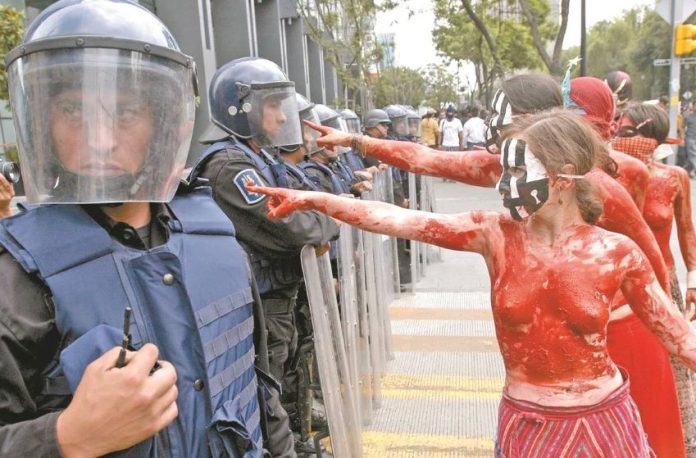It has been more than two years since the Inter-American Court of Human Rights notified the federal government of its resolution with respect to a 2006 case in which more than two dozen women were sexually assaulted by police in México state. But of nine measures it recommended only two have been implemented, according to the victims.
In May 2006, residents of San Salvador Atenco mounted a protest against a restriction banning flower vendors from a market in Texcoco, México state. The residents blockaded a highway and faced off against hundreds of state and federal police in several violent confrontations. Two people died and 26 women, who were among more than 200 arrested, were sexually assaulted by police.
At a press conference to mark the 15th anniversary of the Atenco case, victims of the police abuse asserted that seven of nine measures recommended to the government by the human rights court in December 2018 have not been implemented.
One of them was to strengthen the Mechanism of Monitoring of Cases of Sexual Torture Against Women, a legal instrument.
Sofía de Robina, a lawyer with the Center Prodh, a human rights organization advising the victims, said no progress on strengthening the mechanism has been made since October 2019, and its “functionality has been nonexistent.”
“We have continued documenting the persistence of this practice [sexual torture] against women, many of whom are in prison,” she said.
Another recommended measure was the creation of an independent organization to monitor the use of force by government security forces. De Robina said the Ministry of the Interior has not summoned the Atenco victims to any meeting to discuss the progress toward the creation of such an organization.
“… The Mexican state responded to the court that the institutions [security forces] already have internal control organs and the Federal Auditor’s Office [oversees them],” she said. According to the government, an observatory body to monitor the use of force “could affect the secrecy of an investigation,” de Robina said.
The victims said the government’s response proved that it has no intention to comply with the court’s recommendation.
According to the victims, the other five recommendations were: carry out a thorough investigation into the case that looks at the actions of all police involved; investigate the role of high-ranking state and federal officials; publicly acknowledge the state’s responsibility in the case; offer medical and psychological treatment to victims; and cover the costs of the civil society organization (Center Prodh) that has assisted the victims.
The only recommendations with which the government has complied, according to the victims, is to pay compensation and to publish the court’s resolution.
The Inter-American Court of Human Rights has no power to sanction states that don’t comply with its recommendations.
“… We’ve turned to four different [federal] governments to demand justice, and the four have taken us to the limit of injustice,” said Bárbara Méndez, referring to impunity in the Atenco case.
“We want what happened in 2006 to be cleared up so that [something similar] never happens again,” the victim said.
Source: El Universal (sp), La Jornada (sp)
